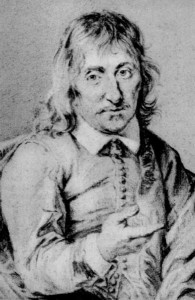Descartes: No body?
René Descartes (1595-1650), drawing by Jan Lievens (1607-1674), zur Authentizität siehe: Richard Watson: Cogito, Ergo Sum
In the next place, I attentively examined what I was, and as I observed that I could suppose that I had no body, and that there was no world nor any place in which I might be; but that I could not therefore suppose that I was not; and that, on the contrary, from the very circumstance that I thought to doubt of the truth of other things, it most clearly and certainly followed that I was; while, on the other hand, if I had only ceased to think, although all the other objects which I had ever imagined had been in reality existent, I would have had no reason to believe that I existed;
I thence concluded that I was a substance whose whole essence or nature consists only in thinking, and which, that it may exist, has need of no place, nor is dependent on any material thing; so that “I,” that is to say, the mind by which I am what I am, is wholly distinct from the body, and is even more easily known that the latter, and is such, that although the latter were not, it would still continue to be all that it is.
After this I inquired in general into what is essential to the truth and certainty of a proposition; for since I had discovered one which I knew to be true, I thought that I must likewise be able to discover the ground of this certitude. And as I observed that in the words I think, hence I am, there is nothing at all which gives me assurance of their truth beyond this, that I see very clearly that in order to think it is necessary to exist, I concluded that I might take, as a general rule, the principle, that all the things which we very clearly and distinctly conceive are true, only observing, however, that there is some difficulty in rightly determining the objects which we distinctly conceive. Descartes: Discourse on Method, IV.

